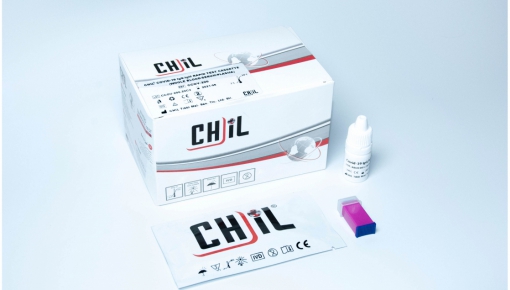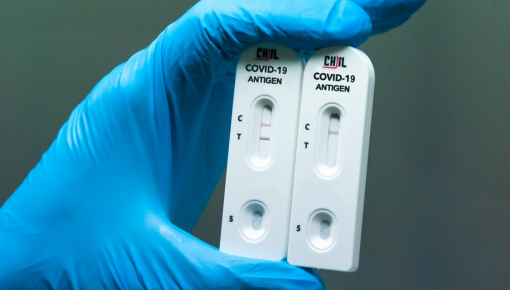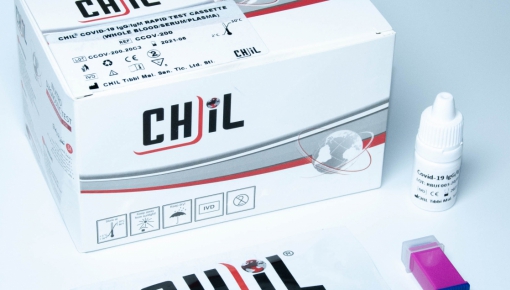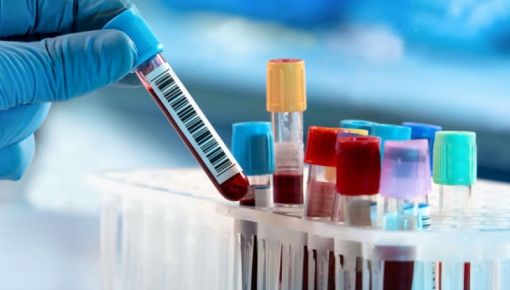Search Result
About Us
Highlights
Blog
Highlights
1. Antibody testing is cheap, simple and accessible compared to RT-PCR The human antibody response has been widely used to help diagnose viral infection.
Compared to RT-PCR assays, the detection of antibody assays are often faster, less expensive, easy to use, and accessible to staff without laboratory training. (1) Scientists state that there exists a real value in antibody testing when performed properly with quality devices and a good understanding of how to interpret the clinical meaning of the results. Antibody testing can provide important insight to individuals about their functional immunity to the ongoing pandemic, giving peace of mind and assisting with decisions about return to community activities and the workplace. (2)
(1) Winter, Amy K.,and Sonia T. Hegde."The important role of serology for COVID-19 control." The Lancet Infectious Diseases 20.7 (2020): 758-759. https://doi.org/10.1016/S1473-3099(20)30322-4
(2) Jacofsky, David, Emilia M. Jacofsky, and Marc Jacofsky. "Understanding antibody testing for covid-19."The Journal of Arthroplasty (2020). https://doi.org/10.1016/j.arth.2020.04.055
2.Antibody testing’s ability to detect past infections over RT-PCR
As August 12,2020 there have been 20.162.474 confirmed cases of COVID-19, including 737.417 deaths, reported to WHO. It is important to note that these figures are likely to be a gross underestimation because the data presented depicts laboratory-confirmed diagnoses only. (2) With the pandemic growing at an alarming rate and national governments struggling to control local epidemics, use of epidemiological solutions are crucial. Locations such as Singapore and Taiwan have been successful in slowing epidemic growth by using intensive surveillance with broader testing strategies to identify and contain cases. By antibody testing, researchers identified the missing link between the A cluster and the other 3 clusters—an individual who had twice tested negative by RT-PCR. This investigation exemplifies the failings of RTPCR as a sole diagnostic method in surveillance, because of its inability to detect past infection, and the added value of serological testing, which if captured within the correct timeframe after disease onset can detect both active and past infections.(1)
(1) Winter, Amy K.,and Sonia T. Hegde."The important role of serology for COVID-19 control." The Lancet Infectious Diseases 20.7 (2020): 758-759. https://doi.org/10.1016/S1473-3099(20)30322-4
(2) Jacofsky, David, Emilia M. Jacofsky, and Marc Jacofsky. "Understanding antibody testing for covid-19."The Journal of Arthroplasty (2020). https://doi.org/10.1016/j.arth.2020.04.055
3. Use of antibody testing is vital to prevent the spread and to track cases
Serologic antibody tests not only can confirm suspected cases after the fact, they can also reveal who was infected and didn’t know it. Up to a quarter of people with SARS-CoV-2 infection may unwittingly spread the virus because they have mild or no symptoms. (1)In public health practice, serological analysis can be useful for rapid case-identification and the subsequent chain of events to actively identify close contacts, recommend quarantine, and define clusters of cases. Contact tracing, which is a necessary but insufficient means of disease control, needs careful effort and is sensitive to timing to be effective, particularly in highly dense populations. Serological analysis can be useful for contact tracing in urban environments and linking clusters of cases retrospectively to delineate transmission chains and ascertain how long transmission has been ongoing or to estimate the proportion of asymptomatic individuals in the population. (2)
(1)Abbasi, Jennifer. "The promise and peril of antibody testing for COVID-19." Jama 323.19 (2020): 1881-1883. https://doi.org/10.1001/jama.2020.6170
(2) Winter, Amy K.,and Sonia T. Hegde."The important role of serology for COVID-19 control." The Lancet Infectious Diseases 20.7 (2020): 758-759. https://doi.org/10.1016/S1473-3099(20)30322-4
4. The role of antibody testing to support infection and vaccination studies
An important application of serological tests is to understand the antibody responses mounted upon SARS-CoV-2 infection and vaccination. Assays that inform on antibody titer and/or show antibody functionality (e.g., virus neutralization) will be extremely useful to answer important scientific questions about immune protection from reinfection. For example, do all infected individuals mount a robust antibody response to SARS-CoV-2 infection? It is unclear whether there is a difference in the antibody responses found in individuals presenting with severe, mild, and asymptomatic COVID-19 and how long antibody responses last. Moreover, it is unknown if the presence of binding antibody to the spike or RBD antigens correlates with virus neutralization. Whether antibody titers (binding or neutralizing) correlate with protection from reinfection is also unclear. Such data will be important when dissecting antibody responses generated by natural infection compared to vaccination. (1)
(1) Krammer, Florian, and Viviana Simon. "Serology assays to manage COVID-19." Science 368.6495 (2020): 1060-1061. https://doi.org/10.1126/science.abc1227
5. Antibody testing is an important necessity for the continuity of healthcare services
Patients and essential workers, such as health care providers, remain rightfully concerned about how to appropriately begin to return to work and community activity in a safe and responsible manner. Many believe that testing for the presence of antibodies on a widespread scale could help drive evidence-based decision-making, both on an individual and societal scale. People with suspected exposure, healthcare workers, in particular, should be tested as high antibody titres likely mean that they are no longer at risk of contracting or spreading the disease and can be preferentially employed in high-risk areas. (1)(2)
(1) Jacofsky, David, Emilia M. Jacofsky, and Marc Jacofsky. "Understanding antibody testing for covid-19."The Journal of Arthroplasty (2020). https://doi.org/10.1016/j.arth.2020.04.055
(2) Salathé, Marcel, et al. "COVID-19 epidemic in Switzerland: on the importance of testing, contact tracing and isolation." Swiss medical weekly 150.11-12 (2020): w20225. https://doi.org/10.4414/smw.2020.20225
6. The need for antibody tests to understand pandemics progression
Although RT-PCR diagnostics will still be vital for identifying acute infection, as the SARS-CoV-2 pandemic continues to spread and cases accumulate, serological testing and data will prove increasingly important to understand the pandemics’ past and predict its future. (1) We are crucially in need of serological tools for investigating antibody responses and assessing individual and potential herd immunity. (2)
(1) Winter, Amy K.,and Sonia T. Hegde."The important role of serology for COVID-19 control." The Lancet Infectious Diseases 20.7 (2020): 758-759. https://doi.org/10.1016/S1473-3099(20)30322-4
(2) Nyazika, Tinashe K., et al. "Implementation of Antibody Rapid Diagnostic Testing versus Real-Time Reverse Transcription-PCR Sample Pooling in the Screening of COVID-19: a Case of Different Testing Strategies in Africa." Msphere 5.4 (2020). https://doi.org/10.1128/mSphere.00524-20
As supported by the articles above and much more, antibody testing plays an essential role in COVID19 diagnostics and continues to be a crucial weapon against the disease. Unlike diagnostics that aiming to detect the presence of the virus only at the time of testing, antibody tests help to identify (1) whether the person is infected, (2)whether or not an individual has had COVID-19 as past-infection and then recovered; even with or without symptoms, (3) to understand the antibody responses to vaccination, (4) for follow-ups, (5) for reinfection diagnosis. Moreover, accessibility of the test makes the screening easier, faster and cheaper on both narrow and large scales, which is considered as an important advantage during the rising of the case numbers and can give us greater insights of the deadliness of the virus and how its spread throughout the population.








